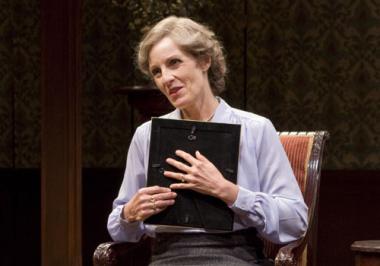Oscar Wilde's short story The Canterville Ghost, written in 1887, is a parody that turns the tables on the classic ghost story. Sir Simon de Canterville, who died mysteriously in 1584, just loves scaring the bejesus out of people. But when the Otises, a thoroughly modern, no-nonsense American family, move into Canterville Chase, they'll have none of that. Annoyed by his clanking chains and gory visitations, they play a series of practical jokes that send the poor ghoul into a quivering mass of translucent protoplasm.
It's a piece, with plenty of Wildean wit at the expense of both brash Americans and stuffy Brits. Irina Brook's adaptation for Shakespeare & Company retains a semblance of Wilde's plot, but strips away every bit of its wit, subtlety and charm. It's an extended riff on the original, improvised by the company but clearly bearing the mark of the director's heavy hand.
There's an added framing device. The old ghost's descendant, Lord Canterville, welcomes present-day tourists (us, the audience) into the drafty old manor house. He's interrupted by a family of Americans of the loud, aggressively friendly variety, from, in case we didn't get it, Texas. Turns out they're related to the Otis family that used to live here—in the 1940s, not 1880s. Like his ghostly ancestor, milord is a bit of a hypnotist and magician, and he transports them back in time to reenact their forbears' story.
The production's improvisational genesis is evident. It's in bits and pieces cobbled together from things that must have seemed hilarious in rehearsal, but aren't. They range from a gang of exotic magicians whose disappearing tricks backfire (in one case, literally) to a deliberately awful rendition of "Achy Breaky Heart."
Irina Brook apparently thinks a joke won't work unless it's sledgehammered home. Here, as in the studio piece she produced at S & Co last year, everything is played at top speed and high decibels. This is particularly ironic, considering that Oscar Wilde was the master of the throwaway quip.
Michael Hammond manages to salvage some dignity, and generate some laughs, with great comic timing and, when he's allowed it, understatement. He plays the present-day Lord Canterville, then becomes the put-upon ghost, wild-haired and increasingly wild-eyed as his attempts at haunting are repeatedly frustrated. He also dons an apron and nanny cap to double as the mansion's crotchety old housekeeper.
The other actors are pretty much trapped in the overheated burlesque mode. Michael F. Toomey and Dana Harrison, both inventive comics in previous S & Co roles, can do little more than mug and yell as ma and pa Otis. Alexandra Lincoln and Alyssa Hughlett play the Otis teenagers, one an annoying show-off, the other a quiet girl who sympathizes with the poor ghost, but neither of them are permitted any character dimension either.
I suppose The Canterville Ghost was intended as a jolly change of pace in Halloween entertainment. Well, the pace is plenty frenetic and it's unrelentingly jolly. But S & Co's production is a pale ghost of the original.
A Voyage of Discovery
In Eleanor: Her Secret Journey, Rhoda Lerman has adapted her own 1979 novel—titled simply Eleanor—as a one-woman play. It focuses on the early married life of Eleanor Roosevelt, before she was First Lady and a world figure in her own right. In the years during and just after World War I, Franklin Delano Roosevelt was Assistant Secretary of the Navy, a stepping stone for his political ambitions. Both were members of the new American aristocracy that was just as vain, ostentatious and inbred as its Old World counterparts. (Eleanor was born a Roosevelt; her uncle was Theodore Roosevelt, and she and FDR were distant cousins.)
Elizabeth Norment's performance is enthralling. It's not an impersonation of this iconic figure. For one thing, the actress looks nothing like her subject, who stood nearly six feet and was, as she says, "too thin, too tall, too tense, with twice as many teeth and three times as much energy as anyone else I knew." Norment captures the restless energy and intelligence, as well as the elite Anglicized drawl and the patrician stance.
She also vividly recreates the various people in Eleanor's life: Franklin's imperious mother, who refers to people beneath her by the acronym NOKD (Not Our Kind, Dear); a philandering FDR, whose persistent affair with his social secretary almost wrecks the marriage; her Uncle Ted, who advises her, "Make him president. That'll keep him home."
In a series of vignettes, the author emphasizes Eleanor's instinctive compassion—and in the process debunks the benevolent image of FDR. With her husband overseas, reviewing the troops in France and taking tea with royalty in Britain, she volunteers at a servicemen's canteen, dancing with the doughboys and flirting with a handsome sergeant. After the war, she and a cocky, triumphant FDR tour the French battlefields, where she is moved by the plight of the plucky, desperate women surviving among the ruins.
In Lerman's portrait, Eleanor's "secret journey" during this period is a voyage of personal discovery, from naivete to social consciousness. In life, she was doing social work in the New York slums when she first met FDR and introduced him to social and economic injustice. And unlike the FDR bios that depict Eleanor as a stiff, aloof figure who drove him into the warmth of another woman's arms, Lerman gives us a passionate woman whose intellect is guided by her feelings."
The Canterville Ghost at Shakespeare & Company, Lenox, 637-3353, www.shakespeare.org. Eleanor: Her Secret Journey at Berkshire Theatre Festival, Stockbridge, 298-5576, www.berkshiretheatre.org. Both shows run through Nov. 9.



